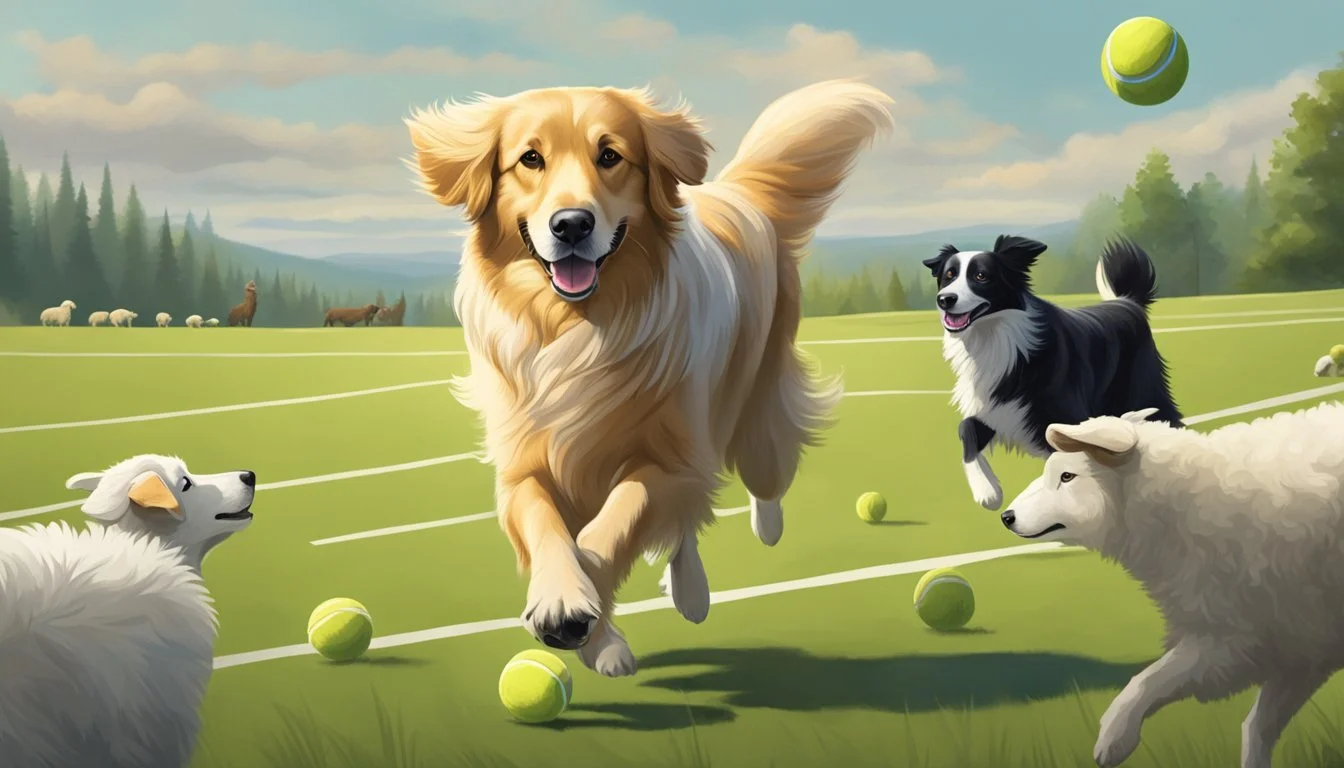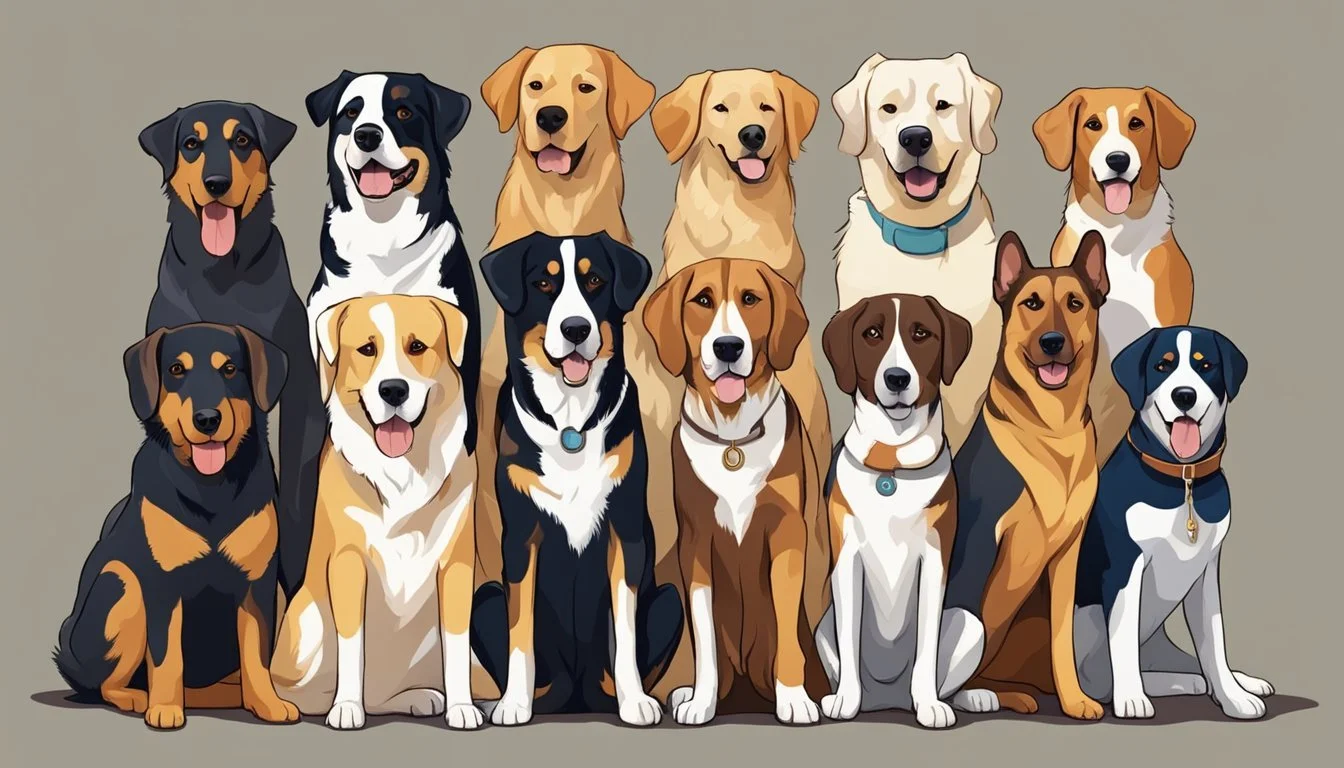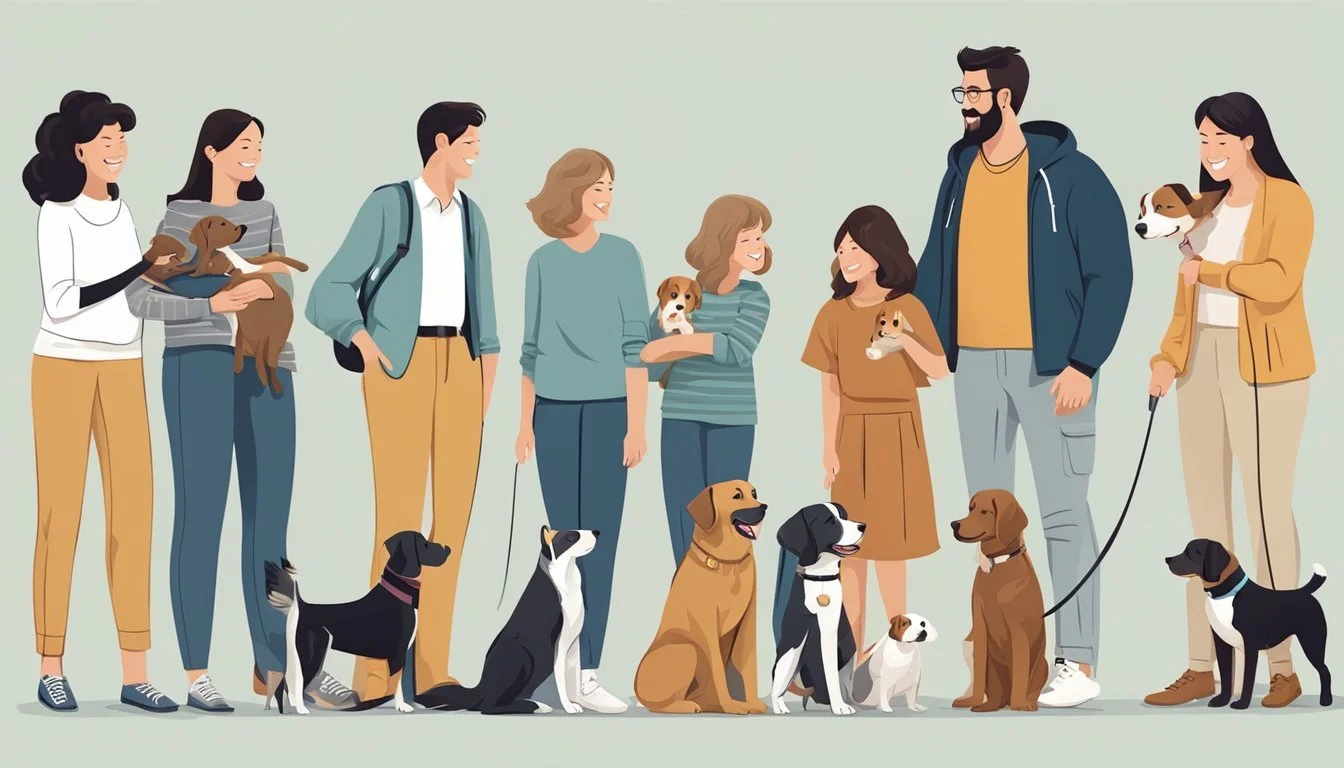Unleash the Truth: Discover the Fascinating Dog Personality Types!
Dogs, like humans, possess distinct personalities that shape their behaviors and interactions. Understanding these personality types can help owners better connect with their canine companions and provide appropriate care and training. While breed-specific traits play a role, individual dogs often exhibit unique characteristics that transcend breed stereotypes.
Dogs typically fall into five main personality categories: confident, independent, happy, adaptable, and timid. Each type influences how a dog responds to stimuli, interacts with people and other animals, and approaches new situations. Confident dogs tend to be assertive and outgoing, while independent dogs may prefer solitude and require less attention. Happy dogs are generally easygoing and sociable, adaptable dogs adjust well to changes, and timid dogs may need extra support in unfamiliar circumstances.
Recognizing a dog's personality type allows owners to tailor their approach to training, socialization, and daily care. For example, a confident dog might thrive in busy environments, whereas a timid dog may need gradual exposure to new experiences. By understanding these personality differences, owners can create a harmonious relationship with their furry friends and ensure their dogs lead fulfilling lives.
Understanding Dog Personality
Dogs exhibit diverse personalities shaped by genetics, environment, and experiences. Recognizing these individual traits helps owners better connect with and care for their canine companions.
The Science of Canine Temperament
Canine temperament is influenced by a combination of genetic and environmental factors. Studies have identified specific genes linked to traits like sociability and aggression. Early socialization and positive experiences play crucial roles in shaping a dog's personality.
Research shows that dog personalities can be categorized into broad dimensions, similar to human personality models. These dimensions often include confidence, sociability, and reactivity.
Brain scans reveal that dogs process emotions in ways similar to humans, contributing to their complex personalities. This neurological similarity helps explain the strong bonds formed between dogs and their owners.
Common Dog Personas
Confident dogs display assertive behavior and adapt easily to new situations. They often take the lead in social interactions and exhibit curiosity about their surroundings.
Shy or timid dogs may show signs of anxiety in unfamiliar environments. They might need extra patience and positive reinforcement to build confidence.
Happy dogs are typically energetic and social. They wag their tails frequently and seek interaction with both humans and other animals.
Adaptable dogs adjust well to changes in routine or environment. They tend to be easy-going and can thrive in various living situations.
Personality Across Different Dog Breeds
While individual variation exists, certain breeds tend to exhibit specific personality traits. Herding breeds often display high energy and a strong work drive. Sporting dogs typically show enthusiasm for outdoor activities and human interaction.
Toy breeds can range from bold to shy, but many are known for their affectionate nature. Working breeds often exhibit confidence and a protective instinct.
Hounds may show independence and a strong prey drive. Terriers are often described as feisty and determined.
It's important to note that breed generalizations don't always apply to individual dogs. Upbringing and personal experiences significantly influence a dog's unique personality.
Key Influences on Dog Behavior
A dog's behavior is shaped by a complex interplay of genetic predispositions, environmental factors, and training approaches. These elements work together to mold a canine's unique personality and behavioral patterns.
Genetics and Dog Personalities
Dog breeds have distinct genetic traits that influence their behavior. Herding breeds often exhibit strong chasing instincts, while terriers may display more tenacious personalities. Some breeds are naturally more sociable, like Golden Retrievers, making them excellent social butterflies.
Genetic factors can predispose dogs to certain temperaments. For example, some bloodlines are more prone to fearfulness or aggression. Responsible breeders consider temperament when selecting breeding pairs to promote desirable traits.
Breed-specific behaviors can impact a dog's interaction with their environment. Working breeds may have high energy levels and require more mental stimulation compared to companion breeds.
Environment and Socialization
A dog's living conditions significantly affect its behavior. Dogs raised in stimulating environments tend to be more confident and adaptable. Lack of proper socialization during critical developmental periods can lead to fearfulness or reactivity.
Exposure to various people, animals, and situations helps shape a well-rounded canine companion. Positive experiences during puppyhood create a foundation for a social butterfly personality.
The role of the guardian is crucial in shaping a dog's behavior. Consistent routines, clear boundaries, and a safe home environment contribute to a balanced temperament.
Stressful or traumatic events can alter a dog's personality, potentially leading to behavioral issues. Addressing these challenges early on is key to preventing long-term problems.
Training Techniques and Personality Development
Positive reinforcement training methods foster confident, eager-to-learn dogs. Reward-based techniques strengthen the bond between dogs and their guardians while encouraging desired behaviors.
Consistency in training is essential for developing a stable personality. Clear communication and patience help dogs understand expectations and build trust.
Different training approaches may be more effective for certain personality types. High-energy dogs might benefit from agility training, while sensitive dogs may respond better to gentle handling techniques.
Early training and socialization classes provide opportunities for puppies to learn appropriate behaviors and social skills. These experiences can help prevent the development of problematic behaviors later in life.
Dog Personality Types
Dogs exhibit diverse personality traits that shape their behavior and interactions. These traits can be broadly categorized into distinct types, each with unique characteristics.
Confident Dogs
Confident dogs display self-assured and outgoing behavior. They approach new situations with curiosity and enthusiasm. These dogs often take charge in social settings and may appear bold or even bossy at times.
Confident dogs tend to be quick learners and excel in training. They're usually eager to please their owners and respond well to positive reinforcement. Common breeds with confident personalities include German Shepherds, Rottweilers, and Doberman Pinschers.
These dogs thrive on mental and physical challenges. They excel in activities like agility courses, obedience trials, and working roles such as police or search and rescue dogs.
Independent Dogs
Independent dogs are self-reliant and often appear aloof. They may not seek constant attention or affection from their owners. Breeds like Akitas, Chow Chows, and Shar-Peis typically exhibit independent traits.
These dogs can be challenging to train, as they may not be as motivated by praise or treats. They often have strong personalities and may be stubborn at times.
Independent dogs generally do well with experienced owners who understand their need for space. They may not be ideal for first-time dog owners or families seeking a highly affectionate pet.
These dogs often excel in tasks that require autonomy, such as guarding or patrolling. They may also enjoy solo activities like puzzle toys or independent play.
Social Dogs
Social dogs are friendly, outgoing, and love interacting with people and other animals. They thrive on attention and companionship. Breeds like Golden Retrievers, Labrador Retrievers, and Beagles are known for their social personalities.
These dogs make excellent family pets and are often great with children. They tend to be adaptable and do well in various living situations, from apartments to large homes with yards.
Social dogs are typically easy to train and eager to please. They excel in group activities and often enjoy dog parks, obedience classes, and social events.
These dogs may be prone to separation anxiety if left alone for long periods. They benefit from plenty of interaction, playtime, and mental stimulation.
Timid Dogs
Timid dogs are shy, cautious, and may be easily startled. They often need extra time and patience to feel comfortable in new situations or with unfamiliar people. Breeds like Greyhounds, Whippets, and some small terriers may exhibit timid traits.
These dogs benefit from gentle, consistent training and socialization. Positive reinforcement techniques work well, as harsh methods can increase their anxiety.
Timid dogs often form strong bonds with their owners and may be wary of strangers. They typically do best in calm, quiet environments with predictable routines.
Creating safe spaces and providing plenty of positive experiences can help boost a timid dog's confidence. With patience and understanding, these dogs can become loving and loyal companions.
Personality Traits of Popular Breeds
Different dog breeds exhibit distinct personality traits shaped by their historical purposes and selective breeding. These traits influence their behavior, trainability, and suitability for various lifestyles and families.
Sporting and Working Dogs
Labrador Retrievers are known for their friendly, outgoing nature and high energy levels. They excel in water activities and make great family pets. Golden Retrievers share similar traits, with a gentle temperament and eagerness to please their owners.
German Shepherds, part of the working group, are intelligent and loyal. They display a strong protective instinct and excel in various roles, from police work to service dogs. Doberman Pinschers are alert, fearless, and highly trainable, making them excellent guard dogs.
Poodles, despite their elegant appearance, are very intelligent and active. They come in three sizes and adapt well to different living situations. Boxers are playful, patient with children, and possess a strong guarding instinct.
Herding and Terrier Dogs
Border Collies and Australian Shepherds are highly intelligent herding dogs. They require mental and physical stimulation to thrive. Corgis, despite their small size, are alert and make excellent watchdogs.
Jack Russell Terriers are energetic, fearless, and sometimes stubborn. They need plenty of exercise and mental stimulation to prevent destructive behavior. Yorkshire Terriers, though small, have big personalities and are often described as feisty and confident.
Giant Schnauzers are loyal, intelligent, and protective. They excel in various dog sports and make great family companions when properly trained and socialized.
Toy and Companion Dogs
Chihuahuas are known for their big personalities in small packages. They're often devoted to a single person and can be wary of strangers. Pomeranians are lively, bold, and intelligent, making them popular companion dogs.
French Bulldogs are adaptable, playful, and affectionate. They do well in various living situations, including apartments. Bichon Frises are cheerful, gentle, and social dogs that get along well with children and other pets.
Shih Tzus are affectionate lapdogs with a sweet and playful nature. They're generally good with children and other pets. Maltese are gentle, affectionate, and highly adaptable to different living situations.
Hound Dogs and Their Unique Traits
Basset Hounds are known for their laid-back, patient personalities. They have a strong sense of smell and can be stubborn when following a scent. Beagles are friendly, curious, and excellent with children, but their strong hunting instincts can lead to wandering if not properly contained.
Siberian Huskies are known for their independent and sometimes mischievous nature. They have high energy levels and require consistent exercise. Akitas are loyal, dignified, and protective of their families. They can be aloof with strangers and require early socialization.
Great Danes, despite their imposing size, are often referred to as "gentle giants." They are patient with children and generally calm indoors, making them suitable for various living situations.
Choosing the Right Dog for Your Family
Selecting the perfect canine companion involves carefully considering your family's lifestyle and needs. A well-matched dog can bring joy and companionship for years to come.
Assessing Your Lifestyle and Family Needs
Consider your living space, activity level, and time availability. Families in apartments may prefer smaller breeds, while those with yards can accommodate larger dogs.
Evaluate your family's energy level. Active families might enjoy high-energy breeds that require lots of exercise, while more sedentary households may prefer calmer dogs.
Think about your schedule. Some breeds need more attention and exercise than others. Be honest about how much time you can dedicate to dog care.
Consider any allergies in the family. Some breeds are more hypoallergenic than others, shedding less and producing fewer allergens.
Selecting a Compatible Dog Personality
Research different breed temperaments. Some dogs are naturally more patient with children, while others may be better suited for adult-only homes.
Consider the dog's energy level. Match it to your family's lifestyle to ensure a harmonious fit.
Think about trainability. Some breeds are easier to train than others, which can be important for families with young children or first-time dog owners.
Look at the dog's social needs. Some breeds are more independent, while others crave constant companionship.
Tips for Introducing a New Dog to the Family
Prepare your home before bringing the dog home. Set up a designated area with a bed, food, and water bowls.
Introduce family members one at a time in a calm, controlled environment. Allow the dog to approach each person at their own pace.
Establish clear rules and boundaries from the start. Consistency is key in helping the dog adjust to its new home.
Supervise interactions between the dog and children. Teach kids how to properly approach and handle the dog to ensure everyone's safety.
Be patient. Allow time for the dog to acclimate to its new surroundings and family. Building trust and a strong bond takes time.
Health and Dog Personalities
A dog's physical and mental health significantly influence its personality and behavior. Proper care, nutrition, and attention to both bodily and emotional needs are crucial for maintaining a balanced and happy canine companion.
Physical Health Impacts on Behavior
Dogs in good physical health tend to display more positive personality traits. Regular exercise promotes energy release and reduces anxiety or aggression. A balanced diet supports optimal brain function, affecting mood and responsiveness. Chronic pain or illness can lead to irritability or depression in dogs.
Breed-specific health issues may also shape personality. For example, brachycephalic breeds prone to breathing difficulties might be less energetic. Regular veterinary check-ups help identify and address health concerns early, preventing negative impacts on behavior.
Mental Health and Emotional Well-Being
A dog's mental health is equally important in shaping its personality. Proper socialization during puppyhood builds confidence and reduces fear-based behaviors. Environmental enrichment through toys, puzzles, and varied experiences keeps dogs mentally stimulated and prevents boredom-related issues.
Stress and anxiety can significantly alter a dog's typical personality traits. Consistent routines, safe spaces, and positive reinforcement help maintain emotional stability. Some breeds are more prone to separation anxiety or noise phobias, requiring extra support.
Recognizing signs of mental distress is crucial. Changes in appetite, sleep patterns, or activity levels may indicate underlying emotional issues. Professional behaviorists can provide strategies to address these concerns and help restore a dog's natural, positive personality traits.




